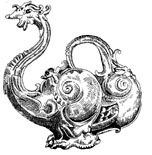
Catholicism Confronts New Age Syncretism
TO DABBLE OR TO DECIDE?
The National Catholic Reporter recently ran a story about the possibility that the Catholic feminist movement known as Women-Church was losing all connection with Catholic tradition. The underlying concern was that Women-Church, in its attempts to be inclusive of all women, was becoming syncretistic. That is, it was willing to accommodate many different spiritual traditions on an equal level with Catholic faith and practice. The report said that an upcoming Women-Church conference would have, in addition to rituals by witches, rituals led by “Buddhists, American Indians, Quakers and Jewish leaders — as well as by Catholic nuns.”
This syncretistic mentality is widespread in the Church today. Witness the following description of the program of a respected Midwestern Catholic center for spirituality:
Readings are selected every day from the sacred texts of Buddhism, Taoism, Hinduism, and Islam, as well as Christianity. On occasion, ancient festivals of the Celts or Saxons are remembered, and members dance around a maypole or fire-pit in the fields or forest…. The Chapel is visually stimulating and instructive…. Icons of Our Lady of Guadalupe and the Risen Christ are placed side by side with statues of Buddha, Lord Vishnu and Moses.
The pervasiveness of this spiritual attitude, much influenced by New Age trendiness, challenges the foundations of our Church. At the same time, however, it offers us an opportunity to re-examine those foundations and ask ourselves just what it is that anchors our identity as Catholics.
You May Also Enjoy
In their usual crude, pragmatic way, the politicians seem to be arriving at a rough…
Malaria kills many in Kenya when there is no chloroquine, but the West consistently sends “huge stockpiles of contraceptives.”
Somewhere in the mid-1960s or early 1970s the women’s movement in this country took a…

